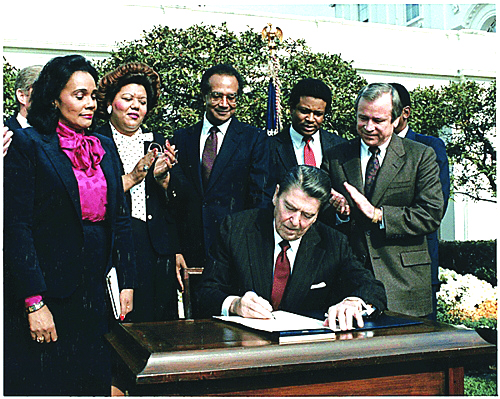By Junifer Hall, JD, MPA, MBA
On a chilly third Monday evening in January 1986, some of the biggest stars in Hollywood and the entertainment industry performed on stage at the John F. Kennedy Center for the Performing Arts in Washington, D.C. Among the performers celebrating the United States of America’s first official national holiday observance in honor of Dr. Martin Luther King, Jr. were Academy Award winner Dame Elizabeth Taylor, Grammy Lifetime Achievement Award winner Diana Ross, Tony Award winner Debbie Allen, and legendary Motown songwriter and Grammy Award winner Stevie Wonder, who sang his signature song, “Happy Birthday To You.” Later, the evening festivities would conclude with a lavish reception at the Washington Convention Center.
More than fifteen years earlier in 1968, legislation would be introduced in the United States House of Representatives four (4) days after Dr. King’s assassination to honor the civil rights leader with a national holiday on his January 15th birthday. Year after year this legislation would prove to be unsuccessful for a lack of support from members of Congress.
On June 16, 1983, U.S. Representative Katie Hall (D-IN-1) introduced House of Representatives Bill, H.R. 3345, with sixty (60) co-sponsors. This legislation simply stated, “On the third Monday in January, a legal holiday shall be established in the United States of America in honor of the life and work of Dr. Martin Luther King, Jr.” As a means of accommodating more federal legislators wanting to join this historic effort as co-sponsors in the House, U.S. Representative Hall reintroduced her version of “The King Bill” on July 29, 1983, as House of Representatives Bill, H.R. 3706, with one hundred and eight (108) co-sponsors.
Despite objections from The Reagan White House and some members of Congress, the House of Representatives voted in favor of H.R. 3706 by a vote of 338-90. After the successful vote was announced, U.S. Representative Hall, the first African-American to represent the State of Indiana in Congress and the manager of the legislation on the House floor commented, “The vote represented a ‘watershed in American history.’ Never before have we had a holiday set aside for a Black American.”
The House members opposed to the national holiday for Dr. King pondered whether Dr. King should be recognized with a national holiday while political giants such as American Presidents Thomas Jefferson and Abraham Lincoln were not so honored by Congress.
The United States Senate passed “The King Bill” on October 19, 1983, with Democrats voting 41-4 in favor of the legislation and Republicans voting 37-18 in favor of the legislation, with a final U.S. Senate tally of 79-22.
On Wednesday, November 2, 1983, Ronald Reagan, 40th President of the United States of America, Members of Congress, The King Family, national business and organizational leaders, and other individuals participated in the Dr. Martin Luther King, Jr. National Holiday Law Signing Ceremony at The White House. After an extensive struggle, House of Representatives Bill, H.R. 3706, as authored and sponsored by U.S. Representative Katie Hall of Indiana became federal law establishing the third Monday in January as a federal holiday in honor of Dr. Martin Luther King, Jr.
More than thirty-five (35) years later, the Dr. Martin Luther King, Jr. National Holiday Law is observed on the third Monday in January, by millions of Americans, and in some form, by people of goodwill in more than 100 countries around the world.
Today, Dr. King’s message of love for humanity, implementation of non-violence techniques, and peaceful resolution to conflicts are continually needed in our world community to combat the evils of greed, hate, and indifference plaguing our land.
The Dr. Martin Luther King, Jr. Holiday Law is a true symbol of American democracy!






